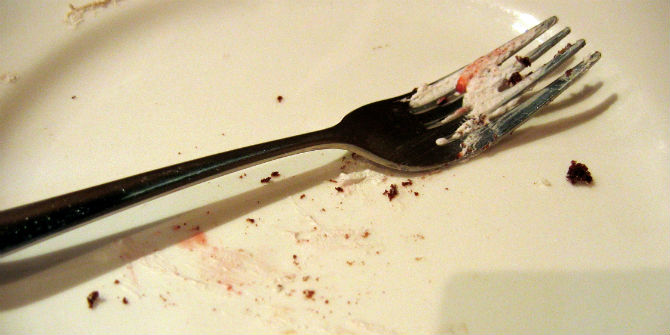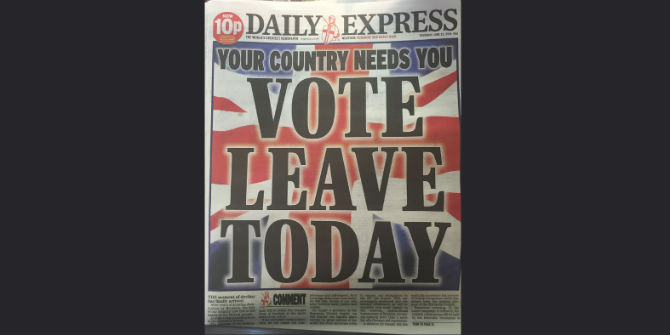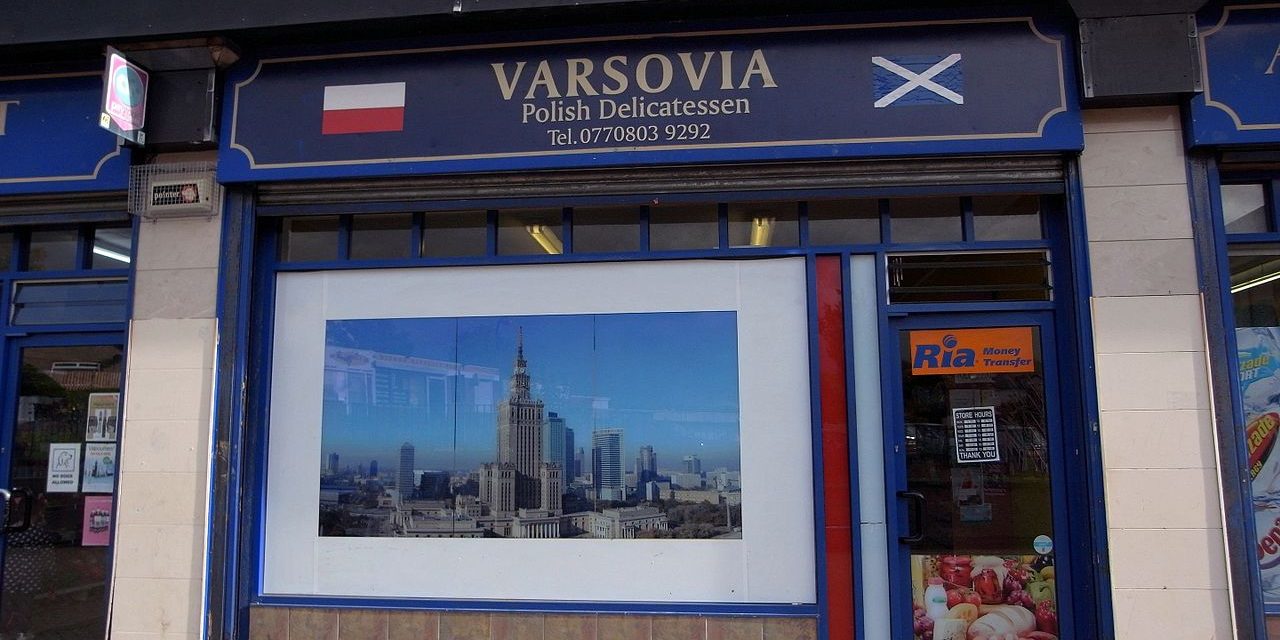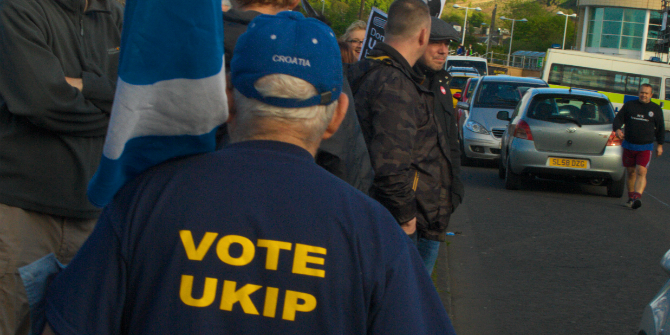Since Boris Johnson first invoked the idea that Britain could ‘have its cake and eat it’ by staying in the Single Market while ending freedom of movement, the phrase has become shorthand for Brexiters’ optimism. Andreas Musolff (University of East Anglia) explains how a metaphorical proverb shot through with hyperbolic assertion proved so powerful.
“[…] this can only be described as a chimpanzee’s tea party Brexit. There is cake everywhere. It’s been had, it’s been eaten, it’s been smeared up walls. It’s had pots of hot tea smashed over the top of it. It’s been scooped on to the end of long hairy fingers and violently jammed into ears.” (The Independent, 8 March 2018)
Cake has been ubiquitous in discussion of Brexit over the past few years. Hundreds of articles and thousands of soundbites have commented on it, all of them referencing – explicitly or implicitly – Boris Johnson’s 2016 promise that Britain could ‘have its cake and eat it’ by reinstating “immigration controls” whilst “continuing open trade with the EU” (interview with Johnson in The Sun, 30 September 2016). Was the ensuing cake-related quarrelling just a bit of rhetorical froth on top of the serious political debates about Britain’s withdrawal from the EU, or did it have a deeper significance?

In order to understand the temporary boom in cake-polemic we first have to look at its “pragmatic” meaning, i.e. as a figurative utterance with practical political implications. Johnson’s use was a reversal of the standard proverb ‘You/One cannot have the cake and eat it, too’, which is in itself a special idiom, as it contains the verb to have in the (now archaic) meaning of ‘to keep’. In its traditional version the proverb expresses a “commonplace” piece of wisdom about the impossibility of consuming and still preserving some good or benefit. Its reversal into an assertion in Johnson’s formulation amounted, strictly speaking, to an absurdity, but it captured the optimistic ambitions of Brexiters. It promised to keep the benefits of access to the Single Market while freeing Britain from its perceived downside, the freedom of movement principle, in a humorous manner. This was reinforced further by Johnson’s own pun on it, “We are Pro-secco but by no means anti-pasto”.
As a witticism, it seems to have been almost immune to the criticism that was immediately raised against it from Brexit opponents both in Britain and abroad (including that it belonged in ‘cloud-cuckoo land’). Even so, the slogan might have quickly passed into political folklore had it not reappeared on a handwritten note carried by a Tory party aide into the then Prime Minister Theresa May’s office in November 2016, when preparations for negotiations with the EU about the Brexit treaty began in earnest: “’What’s the model? Have cake and eat it” (Daily Mirror, 29 November 2016).
From then on, the assertion that Britain could have its (Brexit-)cake and eat it became an omnipresent reference-point for all Brexit-debaters, despite half-hearted denials by the government that it was not an “official” policy statement. No journalist or politician could afford not to have an opinion on it and many of them tried to recycle, reinterpret and even re-allocate it (e.g. as going back to Margaret Thatcher, but also as representing Labour Party views). This ‘boom’ period reached its climax in spring 2018, followed by a levelling-off period until early 2019, when May tried and failed to have the negotiated treaty ratified in the Commons. Since then its usage has sharply declined, but it can still be found in the press in 2020.
Why, then, was it such a successful meme for several years? It exaggerated the chances of a favourable ‘deal’ with the EU by way of tweaking the well-known, pessimistic-sounding proverb into a boastful assertion that a maximally beneficial outcome was possible. It thus combined the creative variant of a metaphorical proverb with a hyperbolic, logically implausible assertion. This combination of rhetorical tropes – metaphor and hyperbole – provided an enormous boost for the persuasive force of Johnson’s proposition by summarising the pro-Brexit position in a memorable way. There was, however, also a communicative risk: that its hyperbolic element would be revealed by opponents not just as unrealistic, but absurd. To counter this danger, Johnson and his allies in the pro-Brexit camp chose to embed it in even more hyperbole rather than weaken it: Brexit was described as making Britain “the world’s brightest beacon of open trade” (international trade secretary Liam Fox), as being a certain success, due to the “negotiating cards [being] incredibly stacked in our way” (Brexit secretary David Davis) and as the nation “breaking free of its manacles like the Incredible Hulk” (Johnson). Meanwhile, both the EU position and May’s ‘moderate’ deal were maximally vilified: the former was compared to a “superstate” like Hitler’s empire, the latter as one of “the most protoplasmic displays of invertebracy since the Precambrian epoch” (Johnson).
Significantly, their opponents on all sides did not manage to counter either the Tory Brexiters’ superlative promises, nor their hyperbolic vilification of the EU or May’s deal. The main pro-Brexit competitor, Nigel Farage’s UKIP (and later his Brexit Party), tried in vain to outdo them, comparing Brexit to the “liberation of the slaves” (Brexit MEP Ann Widdecombe) and denouncing May’s deal as the “worst in history” (Farage). But it was not just right wing politicians: the Labour leader, Jeremy Corbyn, too, revelled in hyperbolic condemnations of May’s deal as the “worst of all worlds” and never effectively countered the vilification of the EU. Lastly, Remainers largely contented themselves with presenting “facts and figures” to contradict the Brexiters’ exaggerations. But if hyperbole has become hegemonic in public discourse, ‘sober’ argumentation and fact-based analysis – while remaining valid principles for scientific analysis – are not sufficient as the sum total of persuasive strategy.
This post represents the views of the author and not those of the Brexit blog, nor LSE.







This article reminds us that, like him or loathe him (and I tend to the latter), Boris Johnson is a superb communicator with the people. His knowledge of Greek and Latin, and the fact that these along with Anglo-Saxon and French form the roots of most English words, and his journalistic experience, allows him to use language in a way which resonates with the British, and more especially the English, people.
Nigel Farage too, like him or loathe him (and I tend to the latter again), is also very good at short soundbites which resonate with the public, even if they are factually very shaky.
This is one of the big weaknesses of the pro-EU cause. It may appeal on an evidence-based and factual level, especially to the more travelled and educated. However it struggles to find the political language to appeal to the various proud nations which make up Europe. I am not quite sure how to do this, but it is crucial for the future of the pro-EU cause.
The leave vote was very much based on fact based analysis:
Oct 2015 – The German Chancellor and French President call for a united Europe to deal with the refugee crisis
Feb 2018 Selmayr shoehorned into eu commission Secretary General position by means of a ‘boardroom coup’
Mar 2018 French President calls for even greater eu integration, an eu wide intitiative to integrate refugees
Oct 2018 eu accounts qualified again
Dec 2018 eu parliament calls for Selmayr resignation by a landslide vote
Aug 2019 Selmayr resigns only because eu commission new president is also German so one of them must go.
And so on and so on.
The Brexit vote was a clear direction by the electorate on the strategic direction that this country should take
The bus slogans, verbiage, atmospherics mere persiflage, nothing more…as the world’s most sophisticated electorate was well capable of discerning.
Democracy: the least worst form of government.